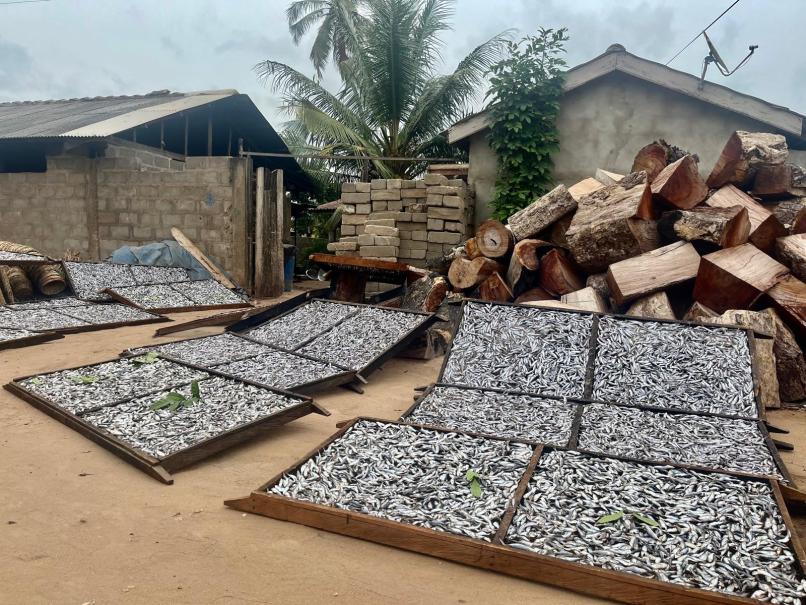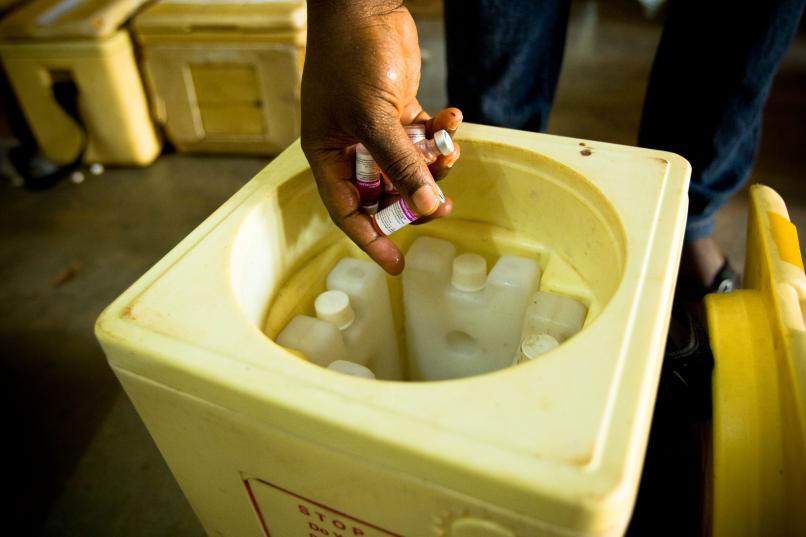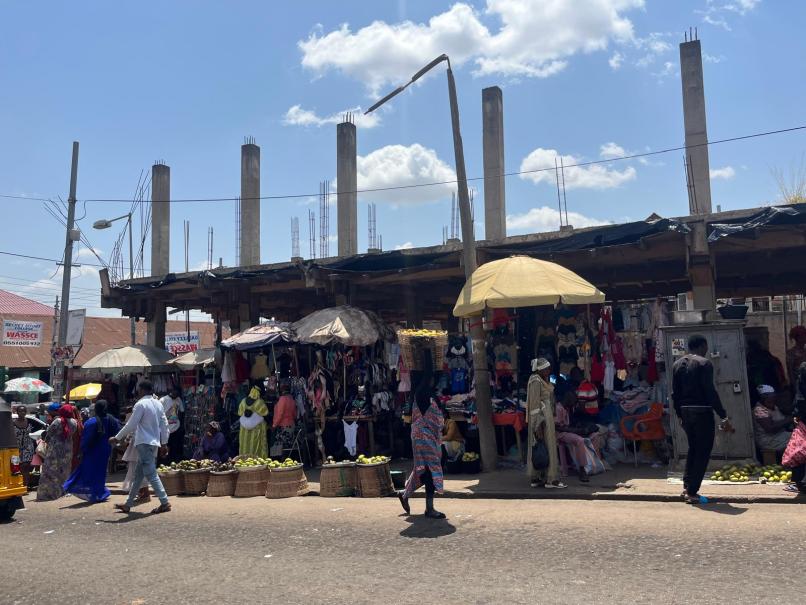Ghana’s cooling challenges and opportunities
This section offers an overview of the three critical sectors where cooling and cold chain systems are essential in Ghana, along with the challenges currently faced and potential opportunities in each sector: 1) food, nutrition and agriculture; 2) health services; and 3) human comfort and safety in the built environment, which encompasses cities and buildings. Other significant cooling needs in Ghana are also highlighted.
Food, Nutrition and Agriculture
Sustainable cooling systems and cold chain infrastructure are vital for reducing food waste, enhancing agricultural productivity and incomes, and combating hunger. Each year, Ghana loses or wastes 3.2 million tons of food in the supply chain, costing the country around GHS 762.32 billion [9]. This food loss exacerbates food insecurity, with around 12.9 million people in Ghana affected by moderate or severe food insecurity in 2022 [10]. Developing cold chain infrastructure could significantly reduce post-harvest losses, ensuring that perishable, nutritious crops and fresh produce are stored and transported effectively. This would not only increase food availability and improve nutrition, but also boost incomes for those dependent on agriculture and food production, including the approximately 7 million smallholder farmers who produce more than 90 percent of the food consumed in Ghana [11].
The economic potential of cold storage and refrigerated transport is particularly acute in Ghana’s fruit and vegetable sector, which offers a potential revenue of up to USD 900 million annually [12]. The country's 2021 National Cooling Plan (NCP) emphasizes the need for refrigeration to support the "Planting for Food and Jobs" campaign, which aims to increase food production and job creation. Additionally, Ghana's industrial transformation programme, which focuses on adding value to agricultural products, underscores the importance of process cooling, particularly in local cocoa bean processing. Ghana, a major cocoa producer, benefits from cooling systems in warehouses and processing plants to prevent cocoa beans from spoiling in the humid climate.
Ghana’s fisheries sector, employing 10 percent of the population [13], is also in critical need of sustainable cooling technologies, services and financing. Women, who play a key role in post-harvest activities, often rely on solid ice for preserving fish. Introducing improved and sustainable cooling technologies could enable longer storage periods, increasing the income potential for women in this sector.
However, the development of Ghana’s agricultural cold chain faces several challenges, including financial constraints for farmers and agribusinesses, limited access to capital and inadequate infrastructure. The lack of refrigerated transport vehicles and logistical support further hampers progress. To address these challenges, investments in infrastructure, capacity building and financial support are needed. Public-private partnerships and targeted policy interventions will be essential to building a robust and efficient cold chain system, ensuring that Ghana can fully realize the economic and social benefits of sustainable cooling.

Health Services
Cold chains are crucial for the safe transport and storage of vaccines, blood products and other temperature-sensitive medical supplies, ensuring they remain effective. In Ghana, the healthcare sector faces significant challenges due to unreliable electricity, particularly in rural areas, which hinders the operation of cooling systems. This issue is especially problematic for national Community-based Health Planning and Services (CHPS) facilities.
Ghana's fractured healthcare cold chain became apparent during the COVID-19 pandemic, with only 14 temperature-controlled vehicles available across the country in 2021, severely limiting the distribution of vaccines and other critical supplies to rural populations. [14]
The pandemic underscored the urgent need for a robust healthcare cold chain in Ghana. As the first African country to receive COVID-19 vaccines through the COVAX initiative, Ghana received an initial delivery of 600,000 doses of the AstraZeneca/Oxford vaccine in February 2021, but vaccination progress was slow. The challenges of frequent power outages, insufficient ultra-cold storage facilities and limited refrigerated transportation hampered efforts to vaccinate the population, with only 2.8 percent vaccinated by July 2021 despite the aim to vaccinate 87 percent of the population. This highlighted the need for significant investments in infrastructure, energy solutions, and comprehensive training for healthcare workers to expand storage capacity and improve vaccine distribution. [15]

Enhancing Ghana's healthcare cold chain is essential for maintaining the efficacy of vaccines, medications and other medical supplies. Addressing the challenges of unreliable energy supply, inadequate infrastructure and limited training requires targeted investments, capacity building and supportive policies. By fostering innovation and public-private partnerships, Ghana can develop a more robust and efficient healthcare cold chain system, improving health outcomes and ensuring the availability of vital medical supplies.
Human Comfort and Safety
Heat mitigation and cooling are increasingly critical in Ghana as rising temperatures, heat waves, and the urban heat island effect (UHIE) impact vulnerable populations, including the elderly, young children and low-income communities. In cities such as Accra, temperatures are nearly 5°C higher than those in surrounding rural areas due to heat-absorbing urban surfaces like concrete and asphalt, combined with the effects of human activities. [16] This exacerbates heat stress, particularly in informal settlements where poor housing construction leads to higher indoor temperatures, posing significant health risks.

Ghana faces substantial economic and health challenges due to heat stress. By 2030, it is projected that approximately 12 percent of working hours in the agriculture and construction sectors will be lost due to heat stress, significantly affecting productivity. In a high-emissions, business-as-usual (BAU) scenario (Representative Concentration Pathway (RCP) 8.5), heat-related deaths among the elderly (65+ years) are expected to rise dramatically, from under two deaths per 100,000 annually (baseline between 1961 and 1990) to almost 70 deaths per 100,000 by 2080. However, a rapid reduction in emissions could limit this increase to about 14 deaths per 100,000 by 2080. [17]
The growing use of active cooling in commercial buildings is also a concern, with air-conditioning accounting for 60-80 percent of annual electricity consumption in offices across Ghana. Furthermore 85 percent of air conditioners (ACs) used in Ghana are of the lowest energy efficiency category (1 star) and the remaining 15 percent are in the next lowest categories (2 and 3 stars). [18] This exacerbates urban heat and contributes to higher greenhouse gas (GHG) emissions, leading to further global warming and cooling equity issues. As cooling demand continues to rise, particularly in expanding cities, mapping current and future hotspots for cooling and deploying higher efficiency appliances will be critical to mitigate the UHIE and ensure equitable access.
The gender disparity in cooling access further underscores the need for targeted interventions. In Accra, for every 100 male slum dwellers over 30, there are 130 women, representing over 4.5 million poor urban women at high risk of heat stress. These women, particularly those working in the informal sector as street vendors and domestic workers, are disproportionately affected by rising temperatures. By 2030, Ghana is expected to see a 350 percent increase in work hours lost to heat stress compared to 1995, further impacting these vulnerable populations. Poorly ventilated compound dwellings in slum communities increase the vulnerability of women to heat stress, with women over 30 reporting higher perceived exposure to heatwaves than men. See more at this link.
Ghanaian mother and child in hospital
Addressing these gender-associated cooling risks requires targeted interventions to improve living conditions in compound dwellings and support community cooling resources. By focusing on these areas, Ghana can enhance human comfort and safety, particularly for its most vulnerable populations, while also addressing broader issues of heat stress and its impact on productivity and health.
Other Cooling Needs
Beyond these critical cooling sectors, many of Ghana's industrial and commercial activities also rely heavily on effective cooling solutions. Manufacturing (i.e., textile, apparel, plastics and chemical), mining and energy industries all require advanced cooling technologies to maintain operational efficiency and safety. Additionally, as Ghana progresses toward its national agenda to digitize the economy, the demand for cooling systems will expand significantly to support nationwide data centres, which are crucial for the ICT transformation. Ensuring that Ghana meets the cooling needs of its expanding industrial and digital infrastructure is critical for sustaining growth and supporting the country's broader economic transformation goals.
Notes and references:
[9] The Global Food Banking Network, 2022.
[10] Care, 2023, Ghana: Inequalities in Food Insecurity.
[11] Corteva, 2022, “Working Together to Support Smallholder Farmers in Ghana”.
[12] International Trade Administration, 2022, Ghana Cold Chain.
[13] Food and Agriculture Organization of the United Nations, Fisheries and Aquaculture Country Profiles Ghana.
[14] International Trade Administration, 2022, Ghana Cold Chain.
[15] GAVI The Vaccine Alliance, 2021, COVAX vaccine roll-out Ghana.
[16] Cosmos S. Wemegah, Edmund I. Yamba, Jeffrey N.A. Aryee, Fredrick Sam, Leonard K. Amekudzi,Assessment of urban heat island warming in the greater accra region, Scientific African, Volume 8, 2020, e00426, ISSN 2468-2276.
[17] International Labour Office, Geneva, 2019 Working on a warmer planet: The impact of heat stress on labour productivity and decent work
[18] Richard Opoku, Isaac Adjei Edwin, Kofi A. Agyarko, Energy efficiency and cost saving opportunities in public and commercial buildings in developing countries – The case of air-conditioners in Ghana, Journal of Cleaner Production, Volume 230, 2019, Pages 937-944, ISSN 0959-6526